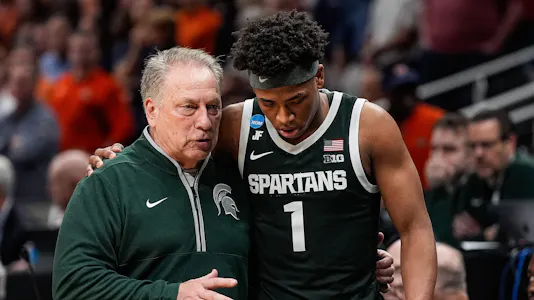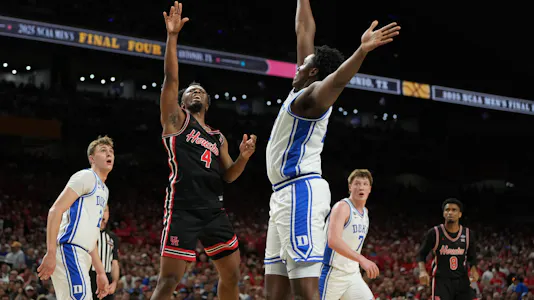What is a March Madness Survivor Pool? How It Works & How to Run Your Own NCAA Tournament Contest

Last Updated: March 16, 2025 8:00 PM EDT • 10 minute read X Social Google News Link

Survivor pools have exploded in popularity in recent years, especially in the NFL. But how does a March Madness survivor pool work and how is it different from a March Madness bracket?
March Madness survivor pools are a perfect way to enjoy the NCAA Tournament while allowing for large groups of people to get involved. They're a perfect addition to any March Madness bracket challenge and can be a change of pace for those looking for a new way to immerse themselves in the madness.
For more on this year's bracket, check out our March Madness bracket reactions.
🏀 What is a March Madness survivor pool? A beginner's guide

📊 How do March Madness survivor pools work?
There are different ways a March Madness survivor pool can work when it comes to format - the most common being round-by-round or daily survivor pools. Both formats work well for the NCAA Tournament, and it's really just about the level of commitment and competitiveness you're looking for with your March Madness survivor pool.
It's important to know the March Madness schedule and key dates, too, as round-by-round is less work than daily for those participating.
🔁 Round-by-round March Madness survivor pool
- Each participant picks one team to win their game per round
- That means picking as many as six winners (first round, second round, Sweet 16, Elite Eight, Final Four, and championship game)
- If their team wins, the participant advances to the next round
- If the team loses, the participant is eliminated from the pool
- You cannot pick the same team twice
- The last participant alive in the pool wins the prize
Best for: Casual players who want a fun alternative to a bracket contest without a daily commitment
📅 Daily March Madness survivor pool
- Each participant picks one team to win their game on each day of the NCAA Tournament
- That means picking as many as 10 winners (two in the first round, two in the second round, two in the Sweet 16, two in the Elite Eight, one in the Final Four, one in the championship game)
- If their team wins, the participant advances to the next day of games
- If the team loses, the participant is eliminated from the pool
- You cannot pick the same team twice
- The last participant alive in the pool wins the prize
Best for: Experienced college basketball fans who want action every day and a bigger challenge
📝 Alternate March Madness survivor pool rules and formats
Some pools also incorporate other rules or wrinkles to make the survivor pool harder or easier. A rule to make it easier can be double elimination, meaning you aren't eliminated on your first loss - basically giving everyone a second chance. A rule to make it more difficult can be restricting picking heavy favorites - you could set a rule of not taking any team favored by more than 15 points, for example.
- Double elimination: You have two chances and are only eliminated after two wrong picks
- Restrictions on picking heavy favorites: Setting a max spread a picked team can be favored by (i.e. not allowing teams favored by more than 15 points)
- Reverse survivor: Picking teams to lose in each round or on each day, with the winner being whoever has the fewest correct picks at the end
- Expanded team use: Traditionally you can only pick the same team once, but you can change that to allow for teams to be used more than once
- Bonus picks: Giving a bonus pick if someone picks an upset correctly
- Seeding restrictions: Limiting the number of high seeds (No. 1, No. 2, No. 3) participants can pick earlier on in the NCAA Tournament
- Draft format: Instead of following a traditional survivor pool format, you can draft teams and whoever has the last team standing wins (i.e. eight participants drafting eight teams each)
- Group picks: Having multiple groups within the pool that make their picks together (can be a good alternate if there are varying levels of college basketball knowledge within the pool of participants)
- Points for picks: Building a point system that rewards riskier picks with more points and removes the elimination aspect by giving zero points for wrong picks, but still allowing participants to stay involved
- Random picks: Participants are randomly assigned team in each round or on each day

❌ What happens if all teams lose in a March Madness survivor pool?
If all teams lose in a March Madness survivor pool, which can happen early or late based on how risky the picks are, there are multiple ways to handle what to do next. It can be as easy as splitting the prize between the participants that were remaining before everyone lost, but there are other options.
- Split the prize: The prize is split across however many participants were left when the final teams all lost
- A second chance: Everyone who made it to the round that led to the final participants being eliminated gets a second chance and continues through the survivor pool
- Most points: If your pool implemented a point system to reward riskier picks, the prize goes to the participant who has accumulated the most points
- Contingency plan: Before you start the survivor pool, make sure to have a contingency plan in place in case this is the outcome, such as some sort of tiebreaker
⚖️ March Madness survivor pool vs. NCAA Tournament bracket pool
With a March Madness bracket, you're picking a winner in every first-round game and from there filling out your bracket all the way to picking a champion at the end. It's the most classic pool to participate in when it comes to the NCAA Tournament, but a survivor pool offers a different experience.
In a survivor pool, you're picking just one team to win in each round or on each day, depending on the format of the pool - often you can only pick the same team once, too. In the survivor pool, you're eliminated when your team loses and the winner is the last participant standing. Whereas with a full bracket, everyone is bound to have wrong picks, so there's a scoring system to ensure that whoever has the most (or highest-value) correct picks win and nobody gets eliminated.
However, a scoring system can be implemented with a survivor pool and the format can be changed to whatever the group wants as long as it makes sense in the context of the survivor pool (eliminating players isn't necessary if you use a point system instead). There's almost more flexibility with a survivor pool than with a bracket because the bracket is such a straightforward concept.
🧐 Key differences between survivor pools and brackets
- Elimination vs. point accumulation: Survivor pools are typically based around making the correct pick and being eliminated when you're wrong with the last participant standing winning. With brackets, you're making every pick and using a scoring system to determine a winner.
- Team use: With a bracket, you're picking every game, so you're picking the same teams to win multiple games. With a survivor pool, you can often only pick the same team once.
- Strategy: With brackets, you're making all your picks at once and thinking about how the entire tournament could play out. With survivor pools, you're only making one pick per round or per day - although long-term thinking is still crucial with survivor pools because you can only pick the same team once.
🛟 How to create your own March Madness survivor pool

💻 Running your own March Madness survivor pool
The most important step for running your own March Madness survivor pool is to decide on the picking format you want to follow. You'll need to choose between following a round-by-round survivor pool or a daily survivor pool, and then within that, you'll need to figure out how many times a participant is allowed to pick the same team (traditionally it's just once).
There are so many different ways you can run your survivor pool, so build it the way you want in a way that works best for the group you're building it for, and don't be afraid to stray from the traditional formats.
Here's a check list for how to build and run your own March Madness survivor pool:
📜 Decide the rules
- Round-by-round or daily survivor?
- Elimination or point system?
- How many times can you pick each team?
- How many wrong picks until elimination?
- How many points for each seed? (Does a No. 12 seed gets more points than a No. 2 seed?)
💰 Determine pool format
- How many participants are there?
- What's the entry fee and payout?
- Does the pot all go to the winner or do second and third place get prizes, too?
- It doesn't need to be a monetary prize, either, and can be more creative like a trophy, gift card, team merch, etc.
📨 Send out bracket & rules
- Make sure everyone has access to an updated bracket
- Make it clear if it's a round-by-round or daily survivor and ensure the participants know what teams they can choose from
- Communicate the rules to all participants
✅ Submitting picks
- Figure out a pick submitting method that works best (email, group chat, etc.)
- Make sure the deadline for picks is clear (i.e. everyone needs their picks in before tipoff of the first game of the round or day)
📊 Track the pool
- Make sure after each round, or each day, there's a list available of the remaining players and the teams they've picked to make sure everyone is informed on who's eliminated and which teams are available to them
- There are plenty of online platforms you can use for your survivor pool, including RunYourPool and OfficePools
✨ Other ways to get involved with March Madness
- March Madness bracket: How to fill out March Madness bracket
- Calcutta auction: What is a March Madness Calcutta auction?
📅 March Madness key dates
- Selection Sunday: March 16
- First Four: March 18-19
- First round: March 20-21
- Second round: March 22-23
- Sweet 16: March 27-28
- Elite Eight: March 29-30
- Final Four: Saturday, April 5
- National championship game: Monday, April 7
🔮 March Madness predictions for every game today
- Louisville vs. Creighton prediction
- Purdue vs. High Point prediction
- Wisconsin vs. Montana prediction
- Houston vs. SIU Edwardsville prediction
- Auburn vs. Alabama State prediction
- Clemson vs. McNeese prediction
- BYU vs. VCU prediction
- Gonzaga vs. Georgia prediction
- Tennessee vs. Wofford prediction
- Kansas vs. Arkansas prediction
- Texas A&M vs. Yale prediction
- Missouri vs. Drake prediction
- UCLA vs. Utah State prediction
- St. John's vs. Omaha prediction
- Michigan vs. UC San Diego prediction
- Texas Tech vs. UNC Wilmington prediction
💰 March Madness betting odds pages
| March Madness Odds | Wooden Award Odds | ACC Odds | Big 12 Odds | Big Ten Odds |
| Final Four Odds | March Madness MVP Odds | Big East Odds | Pac-12 Odds | SEC Odds |
👑 Best March Madness betting sites
Ready to place your March Madness bets? Check out the best March Madness betting promos from our best March Madness betting sites, as determined by our expert team at Sportsbook Review.
- Caesars Promo Code: SBRBONUSDYW | Read our Caesars Review
- BetMGM Bonus Code: SBRBONUS | Read our BetMGM Review
- bet365 Bonus Code: SBRBONUS | Read our bet365 Review
- FanDuel Promo Code | Read our FanDuel Review
- DraftKings Promo Code | Read our DraftKings Review
(21+. Gambling Problem? Call 1-800-GAMBLER)
* Bonuses not applicable in Ontario.
Not intended for use in MA.
Each betting site featured on SBR has been meticulously researched and selected by our team of experts. If you sign up through our links, we may get a commission

Rob Paul X social





